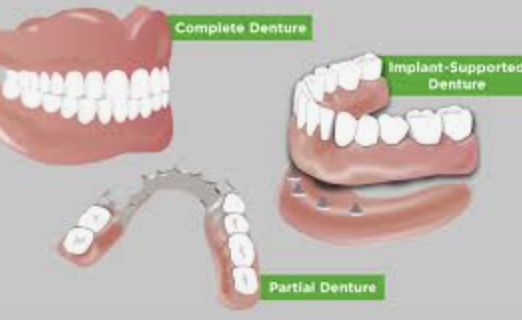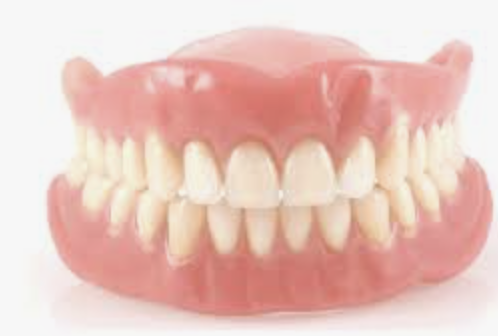Dental Health & Dentures
Guide for the U.S. – last Update 08.20.2025
Dentures 101. A denture is a removable appliance that stands in for missing teeth and gum tissue. There are two main flavors: complete dentures (when all teeth are gone) and partial dentures (when you’ve still got some keepers). Both are custom-made so they fit your bite and face, not a one-size-fits-all gadget you grab off a shelf.

Complete dentures: immediate vs. conventional
- Conventional: your dentist removes any remaining teeth, lets your gums heal and shrink, then makes the final set. You’re typically looking at about 8–12 weeks before delivery, which pays off with a steadier fit long-term.
- Immediate: built ahead of time and popped in the same day teeth come out, so you’re never without a smile. The trade-off? As bone and gums settle, you’ll need more visits for denture adjustment and a denture reline to tighten the fit. Most folks treat immediate dentures as a bridge to their conventional set.
Partial dentures: fill the gaps, keep teeth from drifting
A partial denture clips around your remaining teeth using a pink, gum-colored base and (often) a thin metal framework. It fills spaces, helps chewing, and keeps neighbors from tilting into the gap. Want a stealthier look? Precision partials use hidden attachments to ditch visible clasps. There’s also the fixed route: a traditional dental bridge (crowns on the teeth next to the gap with a fake tooth in the middle), cemented in place—not removable.
Are there alternatives to dentures?
Absolutely. Implant-supported dentures (a.k.a. overdentures) snap onto a few implants for way better stability—great if loose plates drive you nuts. Or, if bone and budget allow, multiple implants with individual crowns or a fixed bridge can feel the closest to natural teeth. Not everyone’s a candidate, so your dentist will check bone, health history, and bite. If you’re pricing things out, ask for itemized denture cost vs. implant options so you can compare apples to apples.
Will insurance help?
Many U.S. plans offer partial denture insurance coverage, but benefits vary widely. Some cover a percentage with a yearly max, others include only basic acrylic options. Before you start, have the office send a pre-estimate so you know your copay, any waiting periods, and whether relines/repairs are included.
How are dentures made?
There’s a reason they fit best when they’re done right. Typical steps:
- Records — impressions, digital scans, and measurements of how your jaws meet.
- Try-ins — wax or plastic mockups you test-drive for denture fitting (shape, shade, speech).
- Finalize — the lab processes the final denture and polishes it smooth.
- Tune-ups — expect a couple of visits for sore-spot checks and bite tweaks; a reline down the road keeps things snug as your gums change.
What do new dentures feel like?
Different—at first. It’s normal to feel full, a bit loose, or salivate more for a week or two. Your cheeks and tongue learn to “steer” the prosthesis, and small rub spots are fixed with quick chairside adjustments. Stick with it and keep those follow-ups; dialing in fit early saves headaches later.
Will I look different?
In a good way for most people. Properly set teeth can fill out collapsed lips and cheeks and sharpen your smile line. Shade and shape are picked to match your style—subtle and natural or a little Hollywood if that’s your lane. Good labs aim for “you, but refreshed,” not one-shade-fits-all best dentures.
Can I eat normally with new dentures?
There’s a learning curve. Start soft: eggs, yogurt, fish, cooked veggies. Cut food small, chew on both sides, and take your time. Add tougher foods as you gain control, but be careful with very hot, sticky, or hard items (nuts, ice, taffy). Skip toothpicks while wearing dentures; they’re invitation-only for sore spots.
Pro tips for day-to-day life
- Clean daily with a denture brush and non-abrasive cleaner; don’t use regular toothpaste (too gritty).
- Soak overnight if recommended, and keep them wet so they don’t warp.
- If they loosen or click after weight loss or gum changes, ask about a denture reline—don’t self-glue.
- For bonus stability, a small amount of ADA-accepted adhesive can help, but it’s not a fix for a poor fit—see your dentist.

Will dentures change how I speak?
Short answer: a little at first. New plates change how air and your tongue move, so certain sounds (“s,” “f,” “th”) might feel weird. Read out loud for 10–15 minutes a day, practice tongue twisters, and give it a week or two—the muscles adapt fast. If your dentures start clicking while you talk or laugh, that can be a fit or bite issue. Try a quick reset—gently bite down, swallow, and keep going—but if the click stays, book your dentist or prosthodontist for an adjustment or denture reline. Extra tip for night drivers in Texas or anywhere: record yourself on your phone to hear which sounds still need work.
Do I wear dentures 24/7?
Only at the very beginning—and that’s on purpose. Many dentists ask you to keep them in the first few days (even overnight) so sore spots show up exactly where they need smoothing. After the initial tweaks, take them out before bed. Your gums need a breather, and your tongue + saliva keep tissues healthy while the dentures soak. That goes for complete dentures and partial dentures alike.
Should I use a denture adhesive?
Adhesive is a helper, not a crutch. It’s great when the fit is good but you want extra confidence—public speaking, playing a brass instrument, long work shifts—or if meds are drying your mouth. A pea-sized amount in a few spots usually does the job. Clean off old adhesive daily so it doesn’t build up and throw off the bite.
When shouldn’t I use adhesive?
Skip it if you’re trying to prop up a loose or poorly fitting plate. That’s a “call the office” situation for an adjust, reline, or remake—especially after weight loss or bone changes. Also pause if you can’t keep up daily cleaning, if you’re piling on more and more adhesive to get through the day, or if you notice irritation or a suspected allergy to ingredients. Long-term heavy use is your sign the foundation needs work, not more glue.
What if I want more stability than adhesive?
Ask about implant-supported dentures (overdentures). They snap to a few implants, cut the wobble, and help with speech and chewing. Not everyone’s a candidate, but if you’re constantly reaching for adhesive or avoiding tougher foods, it’s worth a consult.
Can I adjust or repair dentures myself?
Short answer: don’t. Tweaking a clasp or bending metal at home can crack it, and “do-it-yourself” kits or random superglues can damage the acrylic and irritate tissues. If you’ve got sore spots, rubbing, a chip, or a cracked base, call your dentist or a prosthodontist for a denture adjustment or denture repair—many offices can smooth a pressure point or fix a fracture the same day. If the break is complex, they’ll send it to a lab instead of risking a bad fix.
Will my dentures need to be replaced?
Yes—your mouth changes over time. Bone resorbs, gums remodel, and everyday wear loosens the fit. Expect periodic denture reline (adding material to the inside for a snugger fit) or denture rebase (new base with your existing teeth) as things shift. Most people plan on denture replacement roughly every 5–7 years, sooner if there’s major weight change, fractures, or a chronically loose plate.
Daily mouth care with dentures
Even with full dentures, your mouth needs cleaning:
- Each morning, brush your gums, tongue, and palate with a soft brush to wipe away plaque and boost circulation.
- Wearing partial dentures? Pop them out, then brush your natural teeth—especially around any metal clasps where plaque hides and cavities start.
- Rinse daily with warm salt water if your dentist okays it, and give your gums “time off” at night so tissues can recover.
- Keep nutrition on point; a balanced diet supports healthy oral tissues and better denture comfort.
How often should I see the dentist?
Every six months is a good rhythm. Your dentist (or prosthodontist) checks tissue health, screens for oral disease, verifies the bite and borders, and decides whether you need a denture adjustment, denture reline, or a timeline for denture replacement. If you notice new sore spots, slipping when you talk or eat, or you’re using more denture adhesive just to get through the day, that’s your sign to book a visit sooner.
Dental Health & Dentures — U.S. FAQ
Practical answers on complete and partial dentures, fit, speech, eating, adhesives, relines, and routine care—written for patients across the States.
What’s the difference between complete and partial dentures?
Complete dentures replace all teeth in an arch. Partial dentures clip around the natural teeth you still have to fill the gaps and keep neighbors from drifting. Both are custom-made to your bite, lip support, and speech.
Immediate vs. conventional dentures—how do I choose?
Immediate dentures go in the day teeth come out—no “toothless” period, but expect extra adjustments as bone and gums heal. Conventional dentures are made after healing (about 8–12 weeks) and usually need fewer tweaks long-term.
Will dentures change how I speak or look?
There’s a short learning curve for “s,” “f,” and “th” sounds—read out loud daily and it settles. Esthetically, well-made dentures can refill lips/cheeks and sharpen your smile line. Clicking or lisping that doesn’t improve = time for an adjustment.
Can I eat normally with new dentures? What’s the safest way to start?
Begin with soft foods cut small—eggs, fish, cooked veggies—and chew on both sides to keep plates stable. Add tougher foods as control improves. Go easy with very hot, hard, or sticky items; skip toothpicks while wearing dentures.
Should I wear dentures 24/7 or take them out at night?
Your dentist may ask you to keep them in the first few days so sore spots show up for quick adjustments. After that, remove them before bed to let gums rest and to soak/clean the prosthesis overnight.
When should I use denture adhesive—and when should I avoid it?
Adhesive adds confidence to a good fit—public speaking, dry mouth, long shifts. Use small amounts and clean it off daily. Don’t use it to prop up a loose plate; that’s a sign you need an adjustment, reline, or remake.
How do I clean dentures and care for my mouth every day?
Brush dentures daily with a soft denture brush and non-abrasive cleaner (not regular toothpaste). Rinse after meals. Soak overnight in water or a recommended cleanser. In your mouth, brush gums, tongue, and palate; if you wear a partial, remove it and brush natural teeth—especially around clasps.
What are relines and rebases? How often will I need them?
A reline refreshes the inside surface to match your changing gums; a rebase remakes the base while reusing the teeth. Because bone and gums remodel over time, expect periodic relines and a full replacement roughly every 5–7 years, sooner with big weight changes or fractures.
Can I adjust or repair dentures myself if something bends or cracks?
No. DIY bending or hardware-store glues can weaken metal and damage acrylic. Call your dentist—many simple repairs and pressure-point fixes are same-day; complex fractures go to a lab for a durable repair.
Are implants an option if my dentures feel loose or I want more stability?
Yes—implant-supported dentures snap onto a few implants for better hold, speech, and chewing. Not everyone is a candidate; your dentist will review bone, health, and budget to map the best plan.
Will insurance in the U.S. help pay for dentures, relines, or repairs?
Many plans cover a portion with annual maximums and waiting periods. Coverage varies by state and plan. Ask your office to submit a pre-estimate so you know copays and what’s included (immediate vs. conventional, relines, repairs).
Any red flags that mean I should call the dentist sooner, not later?
Persistent sore spots, rubbing ulcers, sudden looseness, cracks, broken teeth on the denture, a change in your bite, or needing more and more adhesive. These are all signs the fit needs professional attention.












